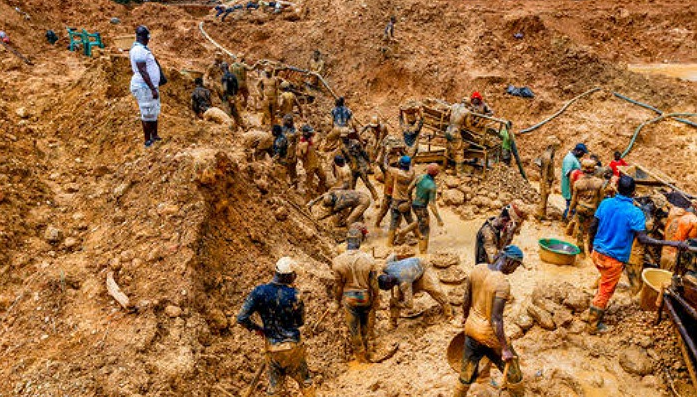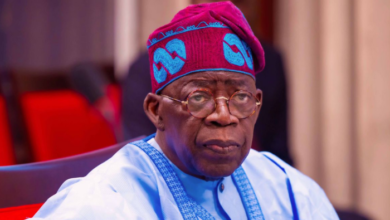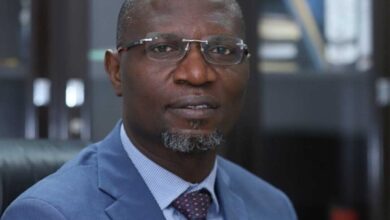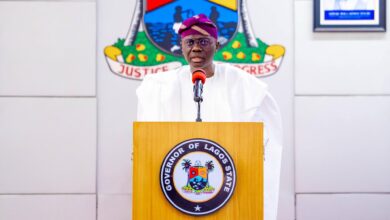Rising demand for gold, minerals fuelling corruption, instability in Africa, others – UN

The growing global demand for gold and other critical minerals is fueling crime, corruption, and instability across the mineral supply chain, particularly in Africa.
This is according to a new report released on Tuesday by the United Nations Office on Drugs and Crime (UNODC).
Titled ‘Minerals Crime: Illegal Gold Mining— part two of the Global Analysis on Crimes that Affect the Environment’—the report explores the key drivers of minerals-related crime, the involvement of various actors, and the movement of unprocessed metals and illicit proceeds across borders.
The report finds that organized crime syndicates, corporations, and individuals are increasingly involved in illegal gold mining and trafficking. These criminal networks are embedding themselves deeper into gold supply chains, drawn by the sector’s soaring profitability and the escalating global value of gold.
In Latin America, drug trafficking organizations have expanded into illegal gold mining, leveraging existing smuggling routes and logistics infrastructure. Proceeds from illicit gold sales are often reinvested into other criminal ventures. In Africa, some crime groups focus solely on gold, while others use profits to finance armed activity, challenge state authority, or fuel violent conflict.
“Gold is a high-risk commodity, frequently used as a tool for money laundering owing to its high value, ease of transport, and because it can be quickly sold or exchanged for cash in many parts of the world,” the report noted. “Traders often act as intermediaries, linking illegally sourced gold with formal markets by using falsified documentation to disguise its origin. Common tactics include declaring gold as recycled, misreporting its country of origin, forging export permits, and bribing officials to obtain mining concessions or avoid legal consequences related to environmental, labour, or safety violations.”
Corruption infiltrates every layer of the supply chain, with risks of fraud and bribery extending to public officials at local, regional, and national levels.
The report also highlights Africa’s vast reserves of minerals essential for the global energy transition—including cobalt, manganese, and platinum. Much of this extraction is done through artisanal and small-scale mining (ASM), which engaged nearly 10 million people across Sub-Saharan Africa as of 2019. However, in regions such as the Sahel, ASM is tightly linked to transnational organized crime and gold smuggling.
In many African countries, politically motivated criminal networks force artisanal miners to sell gold at prices far below market value. Conversely, gold is often smuggled and sold off the books at inflated prices, facilitating money laundering and undermining formal markets. For instance, between 2014 and 2016, artisanal gold from neighboring countries was trafficked into Togo, where buyers paid above-market prices to bypass currency restrictions—distorting local economies and enabling financial crime.
Similar trends have emerged in parts of Asia, where lax regulatory frameworks and high domestic demand have allowed gold smuggling to flourish. In some countries, gold is trafficked to evade import duties or navigate strict currency controls, ultimately depriving governments of much-needed revenue.
The report also warns that communities near illegal mining sites often face dire humanitarian consequences, including sexual exploitation, forced labor, and displacement.
All actors involved in illegal mining—whether criminal groups, corporate entities, or traders—rely on fraud, corruption, and money laundering to disguise the illicit origin of metals and minerals. Weak legal frameworks and enforcement gaps allow them to exploit loopholes, forge documents, and bribe officials to secure mining rights or evade accountability.
Beyond economic and social impacts, illegal mining is wreaking havoc on the environment. The use of banned and hazardous chemicals like mercury, unchecked deforestation, and the illegal disposal of waste are accelerating biodiversity loss, damaging ecosystems, and posing serious public health risks.
“We need better data to quickly spot and respond to the criminal exploitation of the mining sector, together with more globally harmonized legislation and standards,” noted Chief of Research and Analysis at UNODC, Angela Me. “Due diligence and traceability of critical minerals are essential, alongside targeted law enforcement responses to ensure the security of supply chains of critical minerals.”
What you should know
Illegal mining activities in Nigeria are wreaking havoc on the nation’s economy and contributing to escalating violence in affected regions.
Individual offenders are liable to a fine of N5 million or a prison sentence ranging from two to five years. The same penalties apply to groups involved in illegal mining, with each member subject to a N5 million fine or a minimum of two and a maximum of five years imprisonment.








